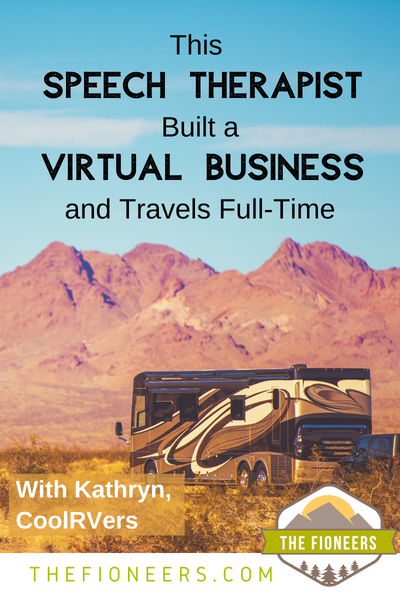

Given our vanlife escapades, my interest is always piqued when I learn about people who are living full-time in an RV. So, when I met Kathryn, I knew I wanted to learn more about what she did for a living to make this work.
It turns out that Kathryn currently runs her own business doing virtual speech therapy. But, she actually started traveling full-time and living in an RV before starting her business. She started this while working as a traveling speech pathologist. I’ve come to learn that this is somewhat akin to a traveling nurse who travels to fill in when there are shortages or people on leave.
On a daily basis, I hear from people who want the freedom to travel more. I’m excited to dig in and share another example of someone who has designed their life to make this possible.
Let’s get into the interview.
1. Tell me a little bit about you.
When I was a teenager, my greatest fear (which was entirely irrational since I grew up in an upper-middle-class family) was that I would end up homeless living in a vehicle. Interestingly, as a now 30-year-old, I’m living my best life doing just that…
Kind of.
My husband, Joel, and I have been full-time RVers for the past 3.5 years. Technically, we don’t have a house and are living out of a vehicle. One could say my worst fears were realized and, as it turns out, living in a vehicle is outstanding!
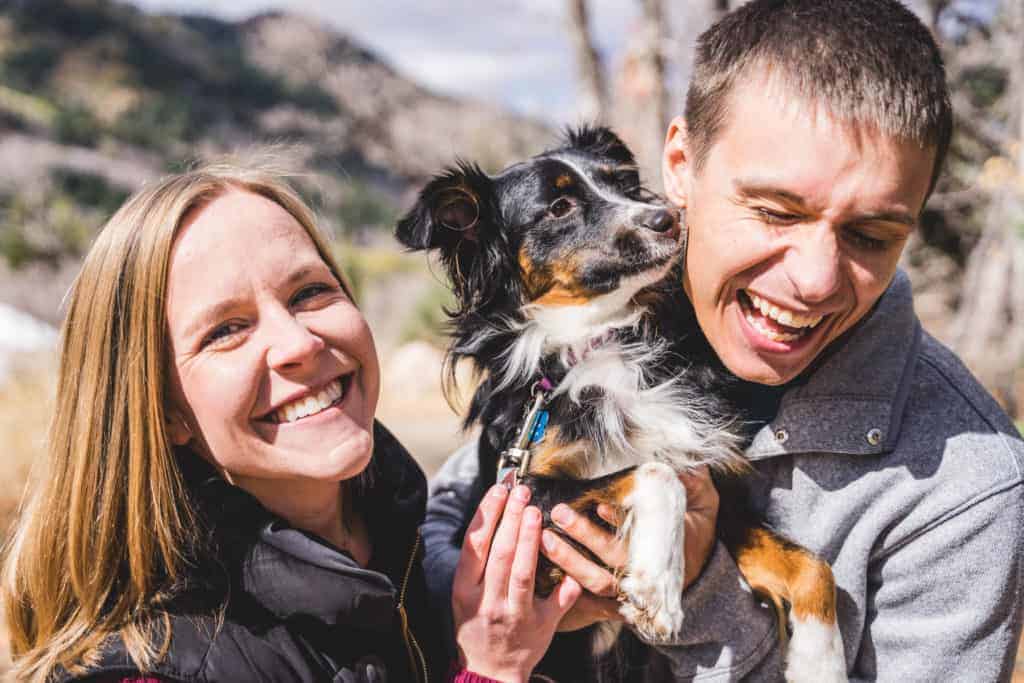

I have been a speech-language pathologist for just over 5 years now. In June 2021, I transitioned to working full-time in my own virtual speech therapy private practice, specializing in literacy.
Now, I get to travel to many beautiful places while doing a job I absolutely love. My absolute favorite place we’ve gone are these Oregon Coast RV parks. Nothing beats looking for critters in tide pools or watching whales splash as the lull of the ocean waves washes away every care in the world.


My husband and I love traveling. We are also avid skiers too, so we spend most winters in the Salt Lake City area stomping as much powder as we can find!
2. Over the last two years, you built up a business that allowed your partner to quit his job. Tell us more about these decisions.
After transitioning to entrepreneurship, one of the biggest decisions we made was for my spouse to quit his job and “retire” at the ripe old age of 28. When I first transitioned to entrepreneurship, Joel was still working full-time in a job he really didn’t like.
Through his job, we had health insurance and a steady, reliable paycheck. So, when I first transitioned to entrepreneurship, we decided to give it a year to see how my private practice went. During this time, Joel would continue to work at his job as I pursued my dreams of being a private practice owner.
Surprisingly, it only took about 2 weeks of working for myself to match my pay from my previous full-time job. And, at this time, I was still building and only working about 10 hours per week with regularly scheduled therapy sessions.
Being an entrepreneur isn’t easy. There are days I want to pull my hair out, though things have gotten a lot better since my early days when I had so much to learn.
These challenges were worth it though. I can make so much more money in less time. A few months into my private practice, we started thinking about retiring Joel earlier than the one-year mark. After about 6 months of my private practice, he put in his notice. He’s been retired since December 2021, and my private practice has only continued to grow since then.
Working in private practice allows me to work fewer hours. When I was first building my private practice, I was working full-time at a school and building my private practice on the side. This resulted in many 12-hour days. Now, I usually work 35 hours a week. In the next 5 years, I plan to reduce my hours even further. Right now, we’re saving up to build a home, so I’ve continued working full-time.
3. How has building your own business impacted your quality of life?
First, let me speak about my spouse’s experience. Having Joel retired has been so much better for his stress. Whenever I used to ask him how his day was, he would respond with a shrug, “It was a day.”


Now the response is usually that his day was awesome! He spent that first winter of retirement enjoying some much-needed and well-deserved time off. He relaxed and recovered. And, he also went skiing and had multiple mid-week powder days since we spent the winter in the Salt Lake City area.
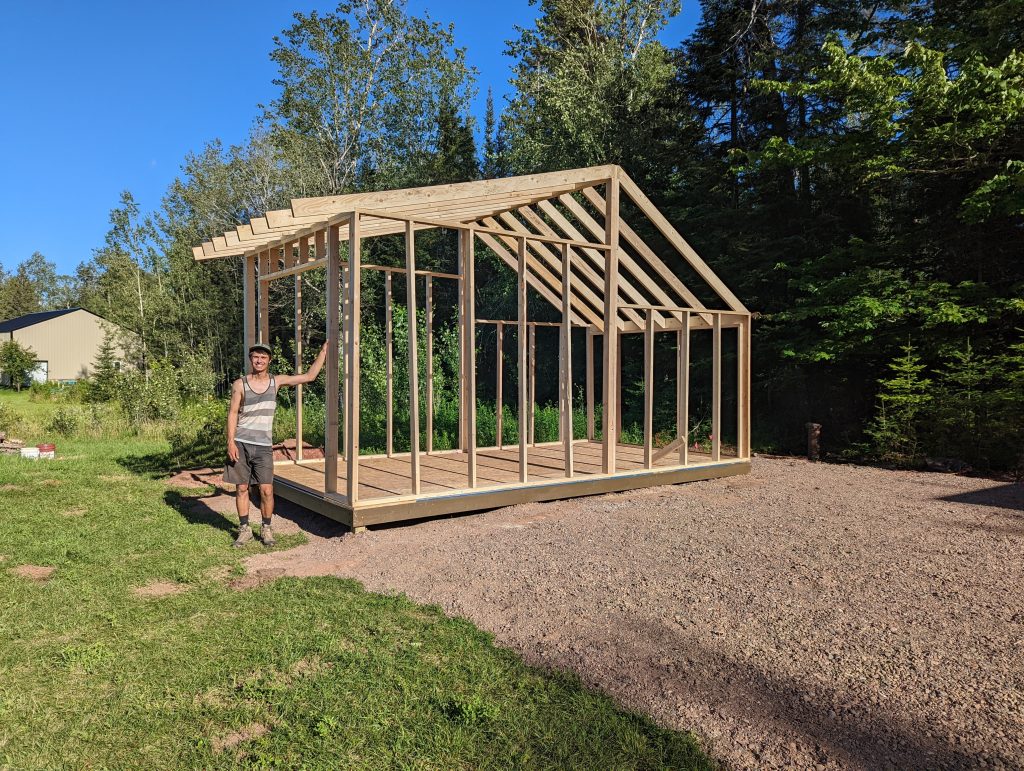

Last summer, Joel spent the summer working on the 3.5-acre property that we purchased in the Upper Peninsula of Michigan. He designed and installed a solar power system that will allow us to be off-grid, leveled an RV site, tapped the well, built an outbuilding and outdoor living space for the RV, and so much more. None of this would have been possible if he was working a 9-5 job. Joel is a super hands-on guy and loves being outside, so being able to work on a place of our own was incredibly fulfilling for him.
Having Joel retired has also made my life so much easier as well. He takes care of everything around the house. The cooking, cleaning, and laundry are always done, so I don’t have to worry about doing all the chores once I finish working. This allows us to enjoy so much more of our time together.
Once I started working for myself, I felt so much more fulfilled in my work. Previously, I had worked primarily in schools. I would see large groups of students and just try to help each of them the best I could amidst all of the constraints. In my private practice, I get to see a lot more tangible progress for my clients. I adore my job and can’t imagine not working in some capacity for many more years.
Entrepreneurship also allows me to have full control over my schedule. I work slightly longer days on Mondays, Tuesdays, and Thursdays. I take half days on both Wednesdays and Fridays. It’s amazing. Having additional time off during the week allows us to have so much more time to get out and explore wherever we are.
Originally, when we started pursuing FI, it was because we weren’t satisfied with our work. Now, we are Coast FI, which means that we have saved enough for our traditional retirement. We simply need to cover our costs now. I am not perfectly content to keep working for as long as I am able to.
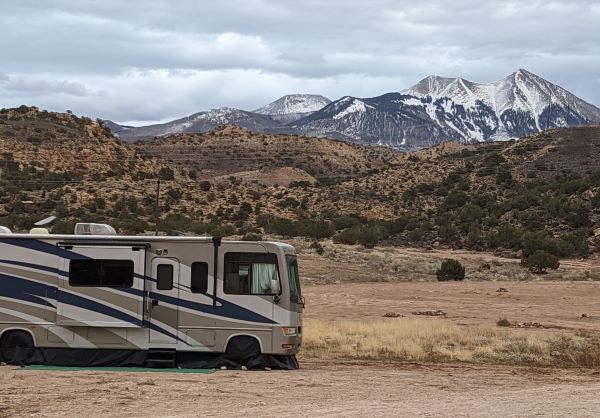

Lastly, since I have a full-time RVing job, we also have so much more freedom to go boondocking. This means we camp on public lands in some of the most breathtaking places you could ever imagine. All for free!
4. In your opinion, what things in your life contribute most to your happiness and contentment?
I absolutely think financial success and, at a minimum, having one’s basic needs covered makes happiness much easier. There is no doubt about that. But considering the fact that only 44% of rich people feel very comfortable in their finances, I think our mindsets are a critical factor as well.
All things considered, my life has been financially stable. I have an amazing family, a great job, and friends I can count on. Still, I felt stressed out and worried constantly about one thing or another for years.
I have been working incredibly hard over the last year to stop thinking of happiness as something I will reach when I accomplish XYZ. I read a wonderful book, called The Happiness Advantage by Shawn Achor that has helped me make this mindset shift.
Too often, we say we’ll be happy when we get to some arbitrary goal post of success. Then, as we get close, we move the goalposts. This deprives us of happiness along the way. I’ve been making a conscious effort to not fall into the trap of saying, “I’ll be happy or I’ll stop worrying about money once we have the house built”.
Making the choice to embrace happiness at the moment has unsurprisingly made me a lot happier and a lot less stressed.
About a year ago, I also gave mindfulness/meditation and self-compassion a try. Initially, I listened to several audiobooks and presentations by Kristin Neff who is a pioneer in the self-compassion space. I also started using the Calm app for guided meditations.
This approach has transformed my life and made me happier than I have ever been. I used to not only be worried the majority of the time, but I also used extremely negative self-talk. I talked to myself like I never would another person. Looking back, I feel sad I treated myself so poorly. Now, I have learned that the best way for me to make the improvements I want is to be kind and encouraging to myself.
A lack of self-compassion is a very common problem in our society, and I am sure many people reading this have also tried to bully themselves to success. I hope you know now that there is a much better, and happier way!
While it’s true that my business has become more successful and stable in the past year, I can say, without a doubt, my mindset has been a major factor in my happiness.
5. How did building your own business (and retiring your spouse) impact your financial goals or timelines?
With the shift to entrepreneurship, I nearly quadrupled my income from when I was working in a school. Even though we are now a single-income family, we can still meet and exceed all of our financial goals.
We have, more recently, slowed down our retirement savings to pay for our home build in cash. With our previous salaries, doing this would never have been possible, even with both of us working. We are choosing to pay in cash because we believe that owning a home free and clear will provide us with tremendous peace of mind.
We have reached Coast FI. If we never add another dollar to our retirement accounts, we’ll be able to retire somewhere between 58 and 63 years of age. We’ll likely continue saving at least some money each month towards retirement, especially once we finish building the house. This would allow us to retire earlier if we wanted or needed to.
All that to say, our financial goals have been much easier to meet even with Joel no longer working.
6. What enabled you to start your business?
There are so many things that have helped us move forward along this path.
First, I had my dad as a role model as I was starting my business. My dad has been a small business owner his entire life. When I was first thinking about starting my private practice, my parents instantly said, “Of course you can do this.” Most people don’t have this kind of family encouragement and support, so I feel really lucky to have people who believed in me (even more than I believed in myself). Having this kind of social support made it easier for me to make the leap.
We also have a lot of advantages financially that it’s important to call out. As white people who grew up in two-parent households in suburban neighborhoods, we have a lot of privileges that gave us a leg up from the get-go. My parents always talked to me and my sibling about finances, paying down debt, and investing, which definitely helped.
My parents paid for my undergraduate college tuition in full, and Joel’s parents were able to pay for part of his tuition. For our wedding, my parents gave us the complete Dave Ramsey kit. I know some people have a problem with Dave Ramsey, and some of his decisions are questionable. But, paying off $60,000 of debt (Joel’s student loans and a new car) within the first 2.5 years of being married set us on a strong financial path.
I was also very fortunate to receive a full-ride scholarship to graduate school. There were a few things that helped fund graduate school. First, I applied to several programs and decided to go with the program that offered me the best financial aid package. Fortunately, it was my top choice, so it was a win-win. I am also bilingual (English and Spanish) and received internships and grants related to my work (past, present, and future) with bilingual populations and people with neurodevelopmental disabilities that helped cover the costs. I did need to commit to working with special education-eligible children for two years after graduation.
I know many speech-language pathologists with 6-figure student loan debt balances. Not being burdened with this kind of debt from the start of my career made it easier for me to make choices that led me to work for myself.
Lastly, we don’t have kids and, at this point, aren’t planning to. So, we have more disposable income than many other folks our age have. We do plan to spoil any nieces or nephews we may have though!
7. What actions did you take early in your career that supported your current unconventional lifestyle?
Initially, moving into the RV three and a half years ago was a strategic financial decision. When we started RV life, I worked for a year as a traveling Speech Language Pathologist. Travel therapists usually work for about 3 months in one location, to fill in for short-term needs like parental leaves, and then move on to the next. Given the transient and unstable nature of the job, you can make a lot more money than you can in a traditional job.
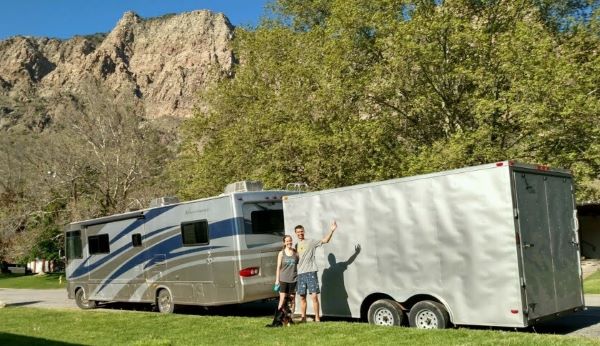

When the pandemic happened, my travel contract got canceled, and I had to pivot to virtual therapy. Eventually, that led to me starting my own virtual private practice. Being willing to take risks early on and throughout my career really set me up to end up where I am today.
Before quitting my job, I started working with clients on the side. I also did other side hustles like cleaning, teaching an after-school class, and babysitting to help eliminate our debt more quickly. All of these actions set us up to more easily pull the trigger on Joel’s retirement, and eventually, we eventually support me to reduce my hours even further.
8. How did your pursuit of FI help or hinder your decision to start a business?
Pursuing full FI initially, even before I knew what Coast FI or Slow FI was, definitely put us in a better position to make the decisions we have. We had already saved a significant amount for retirement which makes coasting to retirement possible for us now. It also helped us build strong financial habits that have set us up for success.
9. Why and when do you think someone might consider “downshifting?”
For Joel, a major consideration in downshifting was that he wasn’t happy in his job. There are so many people who don’t like what they do for work or are stressed out all the time. If that sounds like you, downshifting and making the changes needed to be happy absolutely makes sense.
I also recently read the book, “Die with Zero” by Bill Perkins. I know many in the Slow FI community tout this book and for good reason. It really got me thinking about how I want to spend my money and my time while I’m alive and not just die with a bunch of money left over.
I think it is important to have a decent emergency fund and retirement balance prior to downshifting, but if you’re young, that retirement balance may be much lower than what you think you might need.
10. What advice do you have for someone considering a similar decision?
Do it! We can spend all day crunching numbers, planning, and preparing, but unless we actually pull the trigger, we aren’t any better off.
Looking back at our choice, we knew we were going to retire Joel earlier than we had originally planned. Even though there were some risks associated with this decision, every decision has its own risks. We moved forward anyway and have had one of the best years of our lives together. Don’t be rash, but don’t be scared either.
Thank you, Kathryn, for sharing your story with us!
One important thing I want to note from this interview is that designing your life doesn’t always require a financial trade-off. Many people (including myself) assume that if we transition to entrepreneurship, we’ll make less money. This might be the case for certain types of businesses or in the early stages.
I’ve seen so many examples of entrepreneurs who make more money than they ever made working in a traditional job. I’m still working to get there, but Kathryn’s story helps me believe that it’s possible. For Kathryn, this has allowed her spouse to quit his job, and it’s allowed them to cashflow their land purchase and home build.
Don’t get me wrong, entrepreneurship can be challenging (and sometimes feels like an emotional rollercoaster), but the lifestyle benefits can be tremendous:
- Earning a higher income in less time
- Living where you want
- Setting your own hours
- Traveling as much as you want
I love how Kathryn realized that becoming an entrepreneur was possible because she saw real-life examples, such as her dad, running small businesses. My hope is that by sharing these stories, you will be inspired by these examples of real people and start to believe you can make changes like this as well.
If you’d like to follow Kathryn’s journey, you can find her at CoolRVers.com.

























Thanks for sharing! I would like to know how she was able to get so many clients right off the bat after starting her own practice, and if she accepts insurance or just cash payments? I also work in medicine and am contemplating going virtual/providing telehealth services.
Hi Sophia,
I don’t know, but I will ask her to come and respond here!
Best,
Jess
Hi Sophia,
Kathryn here. I found most of my client initially in several niche Facebook groups for families of kids with disabilities relevant to my field. Most are also homeschooled. I would search through the groups every day to see if someone had asked about something relevant and then respond with answers to questions and share my website. Some also allowed self promotion on a specific thread on certain days of the month. Different FB groups have different rules about that so be sure to follow them.
Just about a year in I paid to take a marketing course which has paid for itself over many times over. It was called Abundant Referrals with Sian Burton. It helped me learn how to connect with other professionals who can refer clients to me. Between the two things it really took off! Plus now that I have a lot of clients I have been getting more word of mouth referrals too. There is a huge need for SLPs right now and I specialize in literacy which also was a benefit to me. Hope that helps!
I am private pay and also take something called the Family Empowerment Scholarship in Florida.